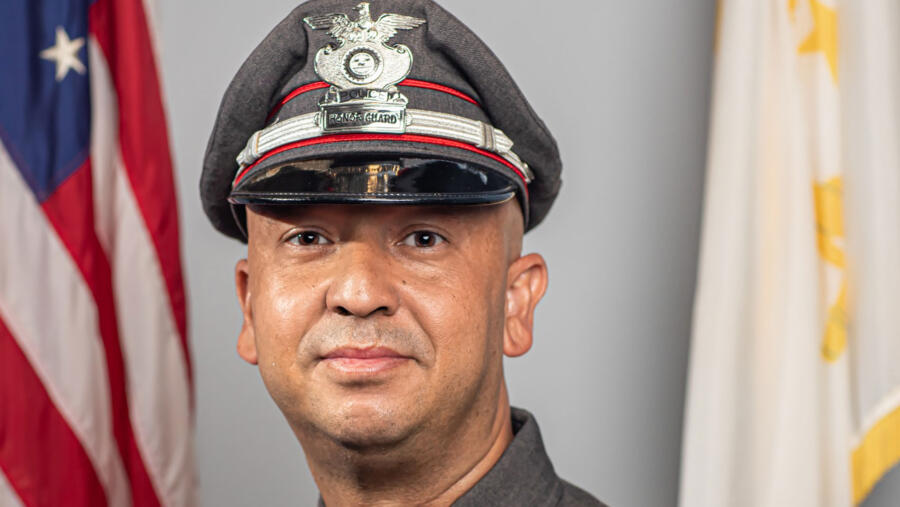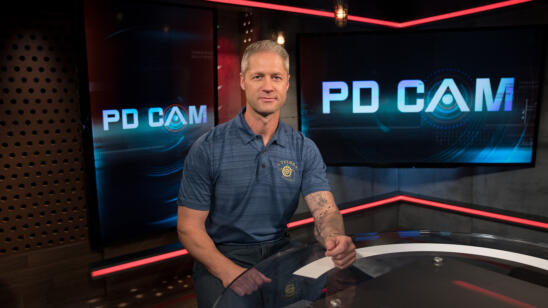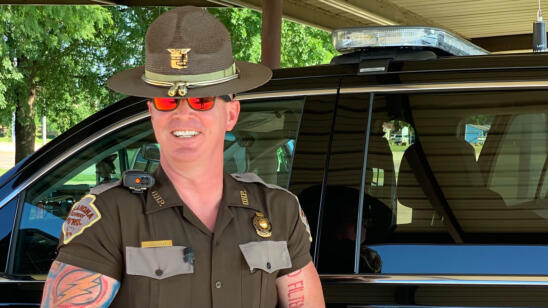At the age of seven, Inspector Craig Sroka moved to the U.S. from Cape Verde, an island nation off the west coast of Africa. He came from a family he describes as “pretty abusive,” and by age nine, a police officer and a caseworker removed young Craig and his siblings from their Rhode Island home. That was the beginning of his road to becoming a police officer. He spoke with A&E True Crime about how he would come to value and prioritize family in the decades to come.
Your childhood was not easy. Tell us about the years following that initial day when you were removed from your home.
We got split up as a family. We all went separate ways, and I went from foster house to group home. The whole time I knew I wanted to be a police officer.
Where did you end up going?
I was adopted by a family and then they decided to move to another state. I didn’t want to go. I went to the house where I [had been doing] yard work and mowing the lawn for about a year, for extra cash. So my mom—now—saw me sitting on the porch, and was like, ‘What are you doing here, Craig?’ And I told her the story and I stayed with them.
They always wanted to be foster parents. They adopted me when I was 15 or 16. I told them what I wanted to do when I grew up. I went to school for law enforcement, stayed out of trouble, and here I am, 18 years later.
Did they support your dream of wanting to go into law enforcement?
Yes. They always had me working, but they were a big support. Not being a citizen, I had to have sponsorship, and eventually get my citizenship, and I was on my way to law enforcement. I got hired at 22, [with the] East Providence Police.
What incidents or events over the course of your career have stuck with you over the years?
This kid, Tyler, was diagnosed with cancer. The prognosis didn’t look very good for him, and his seventh birthday was coming up, in 2014. A friend who’s a local radio personality, messaged me, ‘Hey, Craig, is it possible for you guys to send a birthday card to this kid, Tyler?’
I’m like, ‘We can do one better: I’ll collect a bunch of cards, and I’ll drop them off in a cruiser.’
Apparently, word got out that I was putting together some type of convoy to deliver cards to Tyler. I’m getting calls from all different states, even out of the country, saying, ‘Hey, we want to be part of this.’
It ended up being over five miles of police cars, firetrucks, ambulances and private rescues, called Tyler’s Troops. We got a parking lot that could hold hundreds of emergency vehicles to deliver Tyler his birthday cards. He had to rent storage units for all the gifts and cards he got.
Have you changed anything about how you work after seeing other departments on Live PD?
Yes. I don’t like watching myself, but I enjoy watching other departments. It’s made me have more patience with people. I’ve learned that you can’t go into a domestic dispute and think people are just going to relax right off the bat.
Watching ‘Live PD,’ you can see a lot of officers actually go in with an open mind and they listen. Captain [Bill] Burt [of the Missoula County Sheriff’s Office] and Officer [Darrell] Ross [of the Tulsa Police Department]—I like the way they work. They’re very low-key and calm, but they’ll call people on their BS when they’re sensing that’s what’s going on.
How did you meet your wife, Dana?
We met at a date auction that she organized. I had been at my job two or three years, and someone came up to me and said, ‘We’re looking for officers and first responders to go up for bid for a dating auction.’ It was for a charity, Children’s Wishes.
I’m looking at her like, ‘What are you talking about? I’m not going to prostitute myself for a date!’
So then I decided, ‘OK, I’ll do it for the kids.’ And I suckered some other guys to do it with me so I didn’t feel ashamed and used. [laughs]
I forget what I went for, but it wasn’t as much as I thought—it’s OK, every penny counts. [laughs] For the next few years, Dana would contact me and I would sell tickets for her. And after about five years or so, we went out. We started dating, and I proposed to her. I’m very lucky. People always tell me I married up. I know, I know.
How does being in law enforcement affect your family life?
When I go home, I’m thankful for having a house. I’m thankful for having a backyard. I’m thankful for a lot of simple things that a lot of people take for granted. Having my family and being in law enforcement, they are a balance for each other.
Your kids are a big part of your social media presence. Tell us a little bit about them.
Dana wanted four kids and I wanted two, so we met in the middle and agreed on three. We had our son, Rylan, who’s now four. When she got pregnant again, we went to the doctor and confirmed everything, and the doctor’s like, ‘You guys are having twins.’
They’re Lila and Violet. I cannot tell them apart if they are not together. I’ve changed the same one’s diaper twice. I’ve put them in their wrong cribs when they were clearly labeled. The thing is, I’ll be talking to Lila for a good hour, and then my wife is like, ‘Craig, that’s Violet.’
I’m like, ‘OK, so why don’t you tell me?’
She’s like, ‘Well, I just want to know if you can figure it out on your own.’
Do you have any pets?
When we first lived together, Dana adopted two cats. I didn’t realize I was allergic until we got them. I had to go to the window to get fresh air, but I didn’t die, so we adopted a third cat.
We ended up adopting a black pit bull mix, because they have such a bad rap, and Dana thought he needed a friend. Then we decided to get a third one, and he’s from Houston, so his name is Houston.
So now we have three cats, three dogs and three kids. I do not want three wives.
Related Features
Officer Darrell Ross on His Path to the Tulsa Police Department
Cpl. Mark Laureano of ‘Live PD’ on His Military Background and What Keeps Him Going Every Day
‘Live PD’ Officer Jill Marshall on Going Undercover and Her Approach to Work
Officer Charlie Kingery on Lessons from ‘Live PD’ and Being Himself


